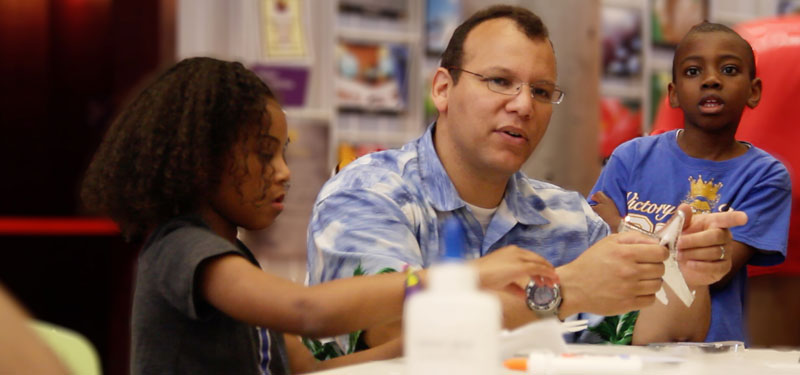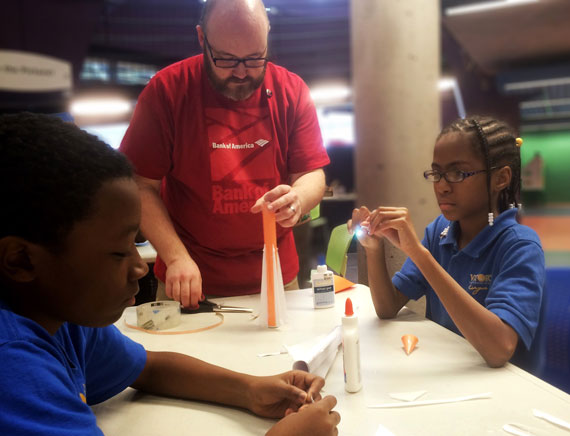In a society where smartphones, tablets, laptops and televisions dominate our attention, a team of Charlotte hackers is showing how to move ideas beyond the boundaries of a digital screen and grapple with gritty problems in the real world.
The group is called Hackerspace Charlotte, and it’s headquartered in a general-store-looking building across from a cotton processing plant in Plaza-Midwood. On the other side of a rustic front porch is a hybrid of a garage, machine shop, design studio and physics lab, staffed by people who probably did well in math classes. Hand tools hang from pegboards, and soldering stations, laser cutters, 3-D printers, lathes, and computer-aided design and manufacturing devices line the walls. On a recent Friday night, kids and parents mobbed the place, built rockets, ate pizza donated by Fuel, vibrated non-Newtonian fluids on speaker cones (see video, top right), and prepared for dramatic geysers with packages of Mentos and bottles of Diet Coke.
Charlotte is one of the leaders in a movement of more than 1,100 hackerspaces that have sprung up worldwide in the last six years. In May 2011, less than a year after its first organizational meeting at a Panera Bread on South Boulevard, Hackerspace Charlotte’s “Feltronics” project won the Great Global Hackerspace Challenge. The kit teaches electronic circuits by combining components with felt, magnets and an intuitive design based on industry-standard symbols. The Charlotte solution prevailed over semi-finalists from Chicago and Brighton, U.K., and was judged by a panel that included Mitch Altman, founder of Noisebridge in San Francisco — one of the first hackerspaces in the United States.
“Hackerspaces all over the world tend to attract people who work in IT,” says Benjamin Gatti, one of the Charlotte organizers. “Principally it’s a social group that centers around people who work in computers in one aspect or another. But it’s always in an extension form. A coffee shop is more than adequate if all you’re going to do is write software. A hackerspace is a little grungier, a little larger, with a little more room for gears and motors and oil and the detritus of ‘mechatronics’ — moving computers into interacting with the world in real ways.”
Education is one of the organization’s central missions, and Charlotte volunteers create and lead challenge projects that teach science, technology, engineering and mathematics at community organizations that include Discovery Place, the Charlotte Mecklenburg Library’s ImaginOn, Scouts and schools. The challenges include rockets, miniature aircraft, hockey-playing robots and hovercraft.
Hackerspace Charlotte organizes these volunteer programs in part to address an educational gap between the virtual, the theoretical and the practical.
“Schools have been sort of systematically eroded in terms of supporting physical activities like wood shop or working with motors and electricity or hands-on activities,” Gatti says. “Some of that was intentional, some was unintentional, some was the logical progression of maintaining this notion that everybody should prepare for a PhD.… At the same time, there’s another trend, which is that a lot of manual labor businesses are going overseas. That means that a lot of people are not growing up with parents who work in factories, parents who work in wood or textiles or furniture, parents who maintain or repair furniture in any meaningful way. So I think that growing up with your dad in that environment may be less common than it was. To some extent we’re bucking these trends very consciously.
“We don’t see working with your hands to be a separate thing from working with your mind. We see them as integrated. We think that working with your hands is a great way to give kids information and experience and an opportunity to explore science and engineering without the overhead and without the burden of taking on a lot of abstract thought….
“We want to get kids involved in making and experiencing these things early because they’ve got to make mistakes, they’ve got to have failures and learn things like, for example, if I don’t add reinforcement parts to my rocket, it breaks. If they don’t have these experiences until after they’ve graduated from college, it’s too late.”

